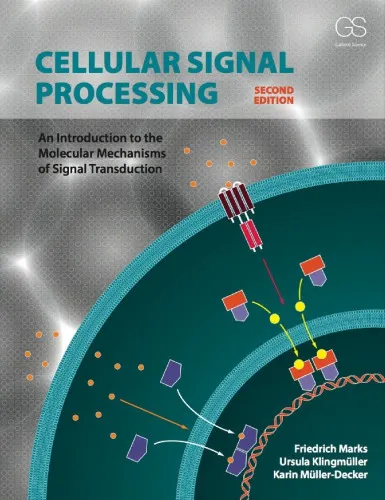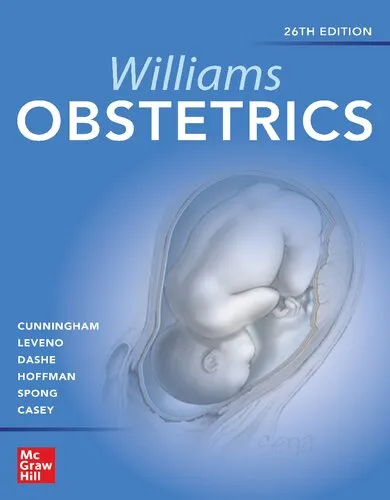Cellular Signal Processing: An Introduction to the Molecular Mechanisms of Signal Transduction
4.3
بر اساس نظر کاربران

شما میتونید سوالاتتون در باره کتاب رو از هوش مصنوعیش بعد از ورود بپرسید
هر دانلود یا پرسش از هوش مصنوعی 2 امتیاز لازم دارد، برای بدست آوردن امتیاز رایگان، به صفحه ی راهنمای امتیازات سر بزنید و یک سری کار ارزشمند انجام بدینکتاب های مرتبط:
مقدمهای بر کتاب 'Cellular Signal Processing'
کتاب 'Cellular Signal Processing: An Introduction to the Molecular Mechanisms of Signal Transduction' یکی از منابع مهم و بنیادین در زمینه زیستشناسی مولکولی و فرآیندهای سیگنالینگ سلولی است که به تفصیل مکانیزمهای مولکولی انتقال سیگنال را بررسی میکند.
خلاصهای جامع از کتاب
در این کتاب، نویسندگان با دقت و جزئیات به بررسی اصول اساسی Signal Transduction پرداختهاند. این فرآیندهای مولکولی نقش حیاتی در فعالیتهای سلولی ایفا میکنند و از اهمیت بسزایی در زیستفناوری و پزشکی برخوردارند. درک این فرآیندها به ما این امکان را میدهد که به درمان بیماریهای مختلف بپردازیم و همچنین بتوانیم درک بهتری از عملکرد داخلی سلولها داشته باشیم. در طول کتاب، انواع مسیرهای Signal Transduction شامل مسیرهای Ras، MAP-kinase، و مسیرهای مرتبط با G-protein به تفصیل توضیح داده شدهاند.
نکات کلیدی
- بررسی دقیق ساختار و عملکرد گیرندههای سطح سلول و نحوه تعامل آنها با لیگاندها.
- توضیح انواع مختلف پیامرسانی مانند autocrine، paracrine، و endocrine.
- تشریح مسیرهای متعدد سیگنالینگ و نقاط تقاطعی که آنها را به یکدیگر مرتبط میسازند.
- بحث درباره نقش مهم آنزیمها و پروتئینها در انتهای مسیرهای سیگنالینگ و چگونگی اثرگذاری آنها بر پاسخهای سلولی.
نقلقولهای معروف از کتاب
«درک بهتر از Signal Transduction نه تنها پنجرهای به سوی فهم بهتر زیستشناسی مولکولی است، بلکه فرصتهای جدیدی برای درمان مدرن ارائه میدهد.»
«مسیرهای پیامرسانی سلولی همانند شبکهای پیچیده هستند که عملکرد صحیح آنها برای حیات سلولی ضروری است.»
اهمیت این کتاب
این کتاب از جمله آثاریست که با دیدگاه جامعی به تحلیل فرآیندهای پیچیده زیستشناسی میپردازد. اهمیت این کتاب نه تنها در محتوی بینظیر و تحقیقات گسترده آن است، بلکه در نحوهی ارائه و سادگی بیان مسائل پیچیده نیز نمایان است. 'Cellular Signal Processing' ابزارهای لازم برای پژوهشگران و دانشجویان را فراهم میآورد تا بتوانند درک عمیقتری از علم مدرن زیستشناسی پیدا کنند. تأکید بر اهمیت بالینی مسیرهای سیگنالینگ و تأثیرات احتمالی آنها بر درمانهای نوین از جمله دلایلی است که این کتاب را در ردیف آثار مهم قرار داده است.
Introduction to "Cellular Signal Processing"
"Cellular Signal Processing: An Introduction to the Molecular Mechanisms of Signal Transduction" serves as a comprehensive guide for anyone interested in the detailed workings of cellular communication. Written by Friedrich Marks, Ursula Klingmuller, and Karin Muller-Decker, this book provides an in-depth exploration into the dynamic world of signal transduction, a pivotal aspect of cellular biology. Making complex scientific concepts approachable, it is a crucial resource for students, educators, and researchers alike.
Detailed Summary of the Book
The book is meticulously structured to cover the fundamentals as well as the advanced aspects of cellular signal processing. It begins with an introduction to the basic principles of cell communication and the nature of cellular signals. Following this, it delves into the biochemical pathways and molecular mechanisms that govern these signals, ensuring clarity by breaking down intricate processes into digestible segments.
Further chapters explore specific signaling pathways, including G-protein-coupled receptors, receptor tyrosine kinases, and nuclear receptors. Each pathway is detailed with a focus on its biological significance and the implications of its dysregulation in diseases. The authors also provide a historical context to signal transduction research, allowing readers to appreciate the evolution of this scientific field.
In later sections, the book transitions into discussing the technological advancements that have propelled signal transduction research forward. From molecular cloning techniques to high-throughput screenings, the authors outline how these tools have enhanced our understanding of cellular processes.
Key Takeaways
- Understanding signal transduction is crucial for comprehending how cells respond to their environment and communicate with each other.
- Disruptions in cellular signaling pathways can lead to various diseases, including cancer and metabolic disorders.
- The book illustrates the interconnectedness of different signaling routes and emphasizes the complexity of cellular networks.
- Technological advancements and methodological approaches are key drivers of progress in signal transduction research.
Famous Quotes from the Book
"The essence of cellular life lies in the cell's ability to perceive and properly respond to its environment."
"Signal transduction is not merely a cascade of biochemical events; it is the transmission of life’s language."
Why This Book Matters
"Cellular Signal Processing" is pivotal because it bridges the gap between complex scientific concepts and practical understanding. It matters for the scientific community and for medical professionals working to develop treatments targeting signal transduction pathways. This book provides the foundational knowledge necessary for innovation in biomedical research, particularly in drug development and genetic therapies.
In academia, the book serves as an essential educational tool that encourages students to embark on a journey of discovery within the molecular realm. Its comprehensive coverage ensures that readers gain a holistic view of cellular signaling, which is indispensable for contributing to future scientific advancements.
Overall, this book's integration of theoretical knowledge with real-world applications makes it an invaluable resource, paving the way for advancements in understanding the communication within and between cells.
دانلود رایگان مستقیم
شما میتونید سوالاتتون در باره کتاب رو از هوش مصنوعیش بعد از ورود بپرسید
دسترسی به کتابها از طریق پلتفرمهای قانونی و کتابخانههای عمومی نه تنها از حقوق نویسندگان و ناشران حمایت میکند، بلکه به پایداری فرهنگ کتابخوانی نیز کمک میرساند. پیش از دانلود، لحظهای به بررسی این گزینهها فکر کنید.
این کتاب رو در پلتفرم های دیگه ببینید
WorldCat به شما کمک میکنه تا کتاب ها رو در کتابخانه های سراسر دنیا پیدا کنید
امتیازها، نظرات تخصصی و صحبت ها درباره کتاب را در Goodreads ببینید
کتابهای کمیاب یا دست دوم را در AbeBooks پیدا کنید و بخرید
1424
بازدید4.3
امتیاز0
نظر98%
رضایتنظرات:
4.3
بر اساس 0 نظر کاربران
Questions & Answers
Ask questions about this book or help others by answering
No questions yet. Be the first to ask!















